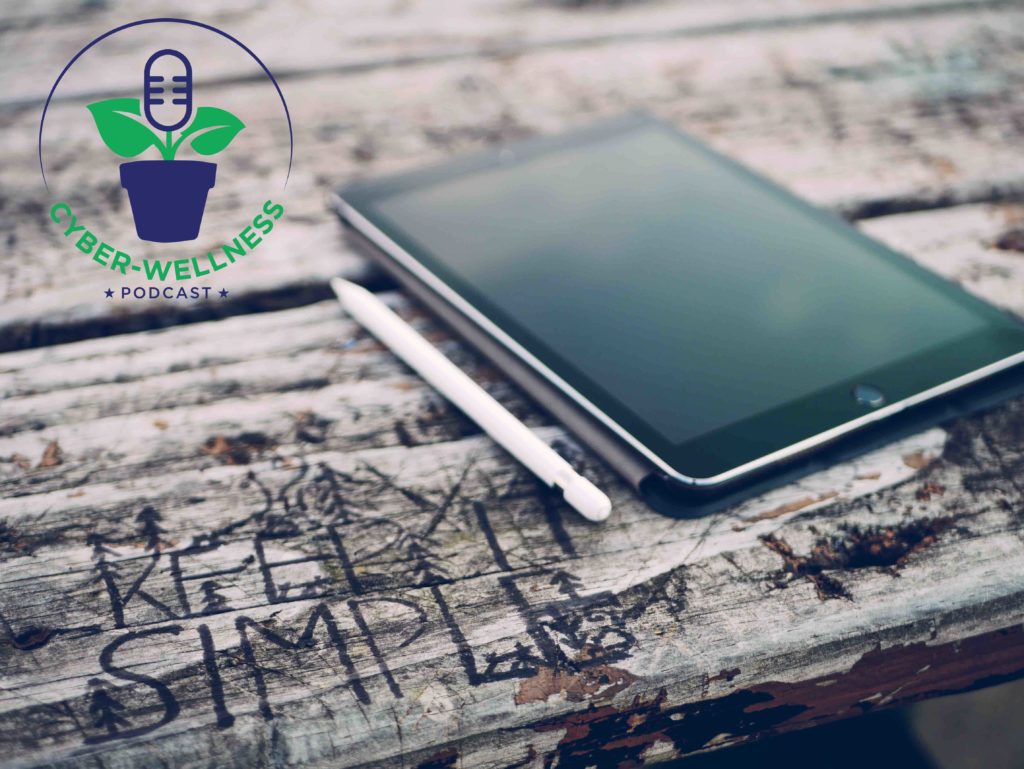PODCAST

The Cyber-Wellness podcast was developed to explore the impact of technology on mental health and wellbeing. It aims to feature very personal perspectives on the use of social media and other digital solutions. The authors of this podcast would like to interview a wide range of Bristolians and Bristol-visiting individuals (ultimately, we would also like to engage with voices from other parts of the UK and the world) on their experiences and work in this area. The main aim of this podcast is not to provide answers, but to open up discussions. The goal is to feature a wide range of personal and professional opinions and findings around cyber-wellness. We all have different views on our wellbeing and relationship with digital technologies. Every opinion and every idea matters – and has a place – in this extremely important discussion.
For more background on the podcast and cyber-wellness please read our story here. For more about the authors click here.
We would love to include your voice in these discussions.
Listen to our past podcast recordings below:
Podcast background:
Cyber wellness is a combination of two concepts: digital literacy and wellbeing. The concept is currently widely used in Singapore by the Ministry of Education for digital literacy projects for young people at schools to ensure that they are all using the web safely but also proactively make the most of it.
There is a lot of discussions now, in 2018, about the increasing importance of mental health and the negative impact of the web on our health, but we feel that conversations are not balanced. On one hand, we have technology developers and providers, practitioners and fans promoting and enjoying the digital landscapes. On the other hand, we have regulators, educators, health professional and parents who worry about the impact of technology on children,m young people and on adults.
In January 2018 WTO introduced gaming addiction as an official disorder. America’s Association of Psychotherapists included the Internet Gaming Disorder in its DSM-5 pointing out the need for further study. Health practitioners warn us about the impact of screen time, FOMO, isolation and gaming addictions. New game addict retreats appear on the market all around the world.
Technology is used to improve our health and mental health. We see smart tech and health monitoring devices entering our everyday lives. We see health data collected via the main mobile platforms and used to improve research. We see the medical field benefiting from various areas of tech innovation. We use apps to improve our every day health and wellbeing: fitness, diet, mindfulness, gratitude and creativity.
The common discourse is focussed mainly on the negative impact of digital on health, but it is based more often on myths than actual findings. Scientific research on the impact of digital technologies on various aspects of our wellbeing is still very rarely considered in public discourse.
Cyberpsychology is a relatively young science studying important themes like comparison and low self-esteem, depression, social isolation, negative relationships, FOMO (fear of missing out), sleep deprivation, addictive behaviour, eating disorders, social media and ADHD, positive correlates of social media, social media and memes, psychotherapy in cyberspace. Since 1995 we can read about it in the Journal of Computer-Mediated Communication. Since 2007 we can enjoy their findings in the Cyberpsychology: Journal of Psychological Research on Cyberspace. There is also the Journal of CyberTherapy & Rehabilitation, as well as Cyberpsychology, Behaviour and Social Networking journal.
The impact of the Internet on our wellbeing is also included in our very own UWE Psycho-social research here in Bristol and specific areas of UWE work – for example, work done by Dr Amy Slater and her team around body image.
In Oxford, Dr Andrew Przybylski researched the impact of online games on children. His research showed that a moderate amount of online gaming resulted in better-adjusted children that those who did not play any games at all – which can be linked to the new media but also lifestyle our children grow up in. Sonia Livingstone described the changes in family life and the new media landscape in her 2002 book: “Young People and New Media: Childhood and the Changing Media Environment” describing area of family life we sometimes discard but that have a significant impact on our media consumption: for example the fact that our children grow up in isolation from their peers in the offline world (driven to school, taken to groups, not allowed to socialise freely offline) so the online channels provide them with new, alternative ways of connecting with peers, playing and learning. Susan Greenfield (also based in Oxford) wrote a good summary of the relevant research in 2014 in her book “Mind Change: How Technologies are Leaving Their Mark on Our Brains” only to conclude that way more research is needed to understand this topic. She herself continues her work in this area.
Sonia Livingstone based in London is since a few years now involved in the EU wide study on the impact of tech on children and families. The research results are published in the regular EU Kids Online reports and impact the way the International Safer Internet Day is celebrated. In the recent few years, we have noticed the purely negative sentiment shifting towards the need to build strong digital skills amongst both children, as well as their parents. In February 2018 Livingstone and team published finding showing the positive impact of technology on the quality of life in families but also increased the need for parents to know that their children are actually safe online.
Dana Boyd, an MIT researcher focussing on teenagers and their use of social media, points out that we need a good definition of what we mean by “safe Internet”. She published her findings in her book in 2014 “It’s Complicated: The Social Lives of Networked Teens” describing her extensive research in important areas: privacy, online identity, addiction, dangers and bullying, inequality and literacy – and generally asking young people how they manage their lives in those new channels. Her findings are certainly not as negative as the discourse in the mainstream media.
Jane McGonigal, American game designer advocates the use of digital technologies to channel positive attitudes and explains a lot of positive effects of games in her 2001 book “Reality is Broken: Why Games Make Us Better and How they Change the World” tapping into findings from also a fairly new field of positive psychology.
At the same time, the public discourse around mental health and wellbeing increasingly mentions the negative impact of digital technologies: information overload, need to rest from screens, fear of missing out, online bullying, addiction to online games and the overwhelming sense of increased social isolation. We do also see increased levels of addictions related to the Internet and studies showing that the social web tends to exaggerate the tendencies we already have (if they are positive, the impact of the web is positive too; if our habits and tendencies are harmful, the social web might make them more impactful too).
In the marketing and business world, it is widely recognised that addiction to mobile and other tech devices is fuelling stress and burnout and has been linked to anxiety and depression. Increasingly, a number of research and partnership initiatives are being put in place to address the positive and negative effects of cyber-overload and how to achieve a state of cyber-wellbeing.
April 2018, saw the Pew Research Center launch their extensive report: ‘The Future of Well-being in a Tech-Saturated World’ which explored at length the positive and negative aspects of digital life on people’s health, mental fitness and happiness. While in May 2018, Thrive Global, set up by cyber wellbeing pioneer, Arianna Huffington whose mission is to end stress and burnout, announced an important partnership with MindShare Partners, whose mission is to ensure that those suffering from mental health and burnout conditions in the workplace get heard and helped to thrive. Just these two key areas of activity in the cyber-wellbeing arena from Pew Research and Thrive Global in Spring 2018 – let alone myriad other similar initiatives – are a clear indicator that the complex topic of cyber-wellbeing is driving an ongoing debate around the world. As podcast authors of Bristol’s Cyber-Wellness Podcast, we hope that our own podcast findings can serve to make a small contribution, from Bristol to the global debate around cyber-wellbeing.
The mental health provision in the UK is based on the 2008 New Economics Foundation report “5 Ways to Wellbeing”. The report outlines core recommendations for improving our overall well being and serves as a basis for the overall provision of talking therapies around the UK until today. Connect, keep active, take notice, keep learning and give are recommendations resembling core findings of positive psychology. The report also mentions the value of nature, healthy diet and meaningful work. Many of those recommendations are aligned with findings published by Johann Hari in his book “Lost Connections: Uncovering the Real Causes of Depression – and the Unexpected Solutions” about underlying causes of depression. Harri suggests looking at the roots of our mental health problems and instead of disconnecting, even more, finding ways to reconnect with our communities, meaningful work, values and nature. We do not really know if digital technologies would play a positive or negative role in this process.

__
You can find out more about the Cyber-Wellness Podcast here. You can listen to the first episodes on SoundCloud here.